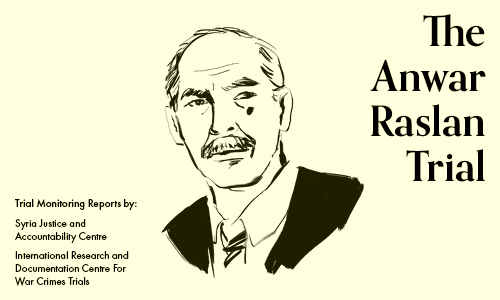
Glossary - Essential Terms for Understanding the Koblenz Trial
Glossary
Essential Terms for Understanding the Koblenz Trial
A PDF of this resource is available here.
| German | English | Definition |
| Angeklagter | defendant | A defendant is an accused person or indicted accused in respect of whom a decision has been taken to open the main criminal proceedings (§ 157 alternative 2 StPO[1]).Anwar Raslan and Eyad Al-Gharib are the defendants in this case. |
| Aussageverweigerungsrecht | right to refuse to provide evidence | Every accused has the right to refuse to testify in criminal proceedings. He or she must be expressly informed of this right during his or her questioning by police officers, prosecutors or judges. |
| Auskunftsverweigerungsrecht | right to refuse to give information | A witness is allowed to refuse to answer any questions the reply to which would expose him/ herself or a member of his/ her family to the risk of criminal prosecution. |
| Belehrung | instruction | An instruction is always given at the beginning of an interrogation or testimony in court to inform the person about his/her rights and duties. It is a necessary procedural requirement and if forgotten, can have a severe impact on further proceedings (e.g. prohibition to use certain statements). |
| Beschuldigter | accused | An accused is a person who is suspected (on the basis of sufficient factual indications) to have committed a crime and against whom a preliminary investigation was started. The term is also used during the entire course of proceedings to describe the person who allegedly committed a crime. |
| In Augenscheinnahme | inspection | Inspection means a direct appreciation of the qualities of an object, an event, a process or conduct through the use of the five senses. The judges may, for example inspect documents, photos, videos or audio recordings. |
| Beweisantrag | request for evidence | As a matter of principle, the judges are obliged to extend the taking of evidence to all facts and means of proof which are relevant to their decision. Nevertheless, the defense and the prosecution have the right to request the taking of additional evidence. Such applications are – as a rule – binding on the judges and may only be rejected under exceptional circumstances proved for in § 244 StPO. |
| Vorhalt | “refreshing” the recollection of a witness; remonstration | Any party to the trial can use a remonstration to confirm or clarify a statement previously made by a witness/expert/defendant. A remonstration always refers to a statement which was given at a prior state of the investigation or trial. It is used to recall a person’s memory and confirm or clarify ambiguities in a person’s statement. |
| Tatverdächtiger | suspect | A person is considered a suspect if there are grounds to believe that he/she committed a crime. |
| Verurteilter | convicted person | A convicted person is a person against whom a sentence has been finally imposed. |
| Vernehmung/Verhör | interrogation | Interrogation is the questioning of an accused conducted by law enforcement agencies for the purpose of clarifying the course of an alleged offence.The interrogation begins with the questionee giving his or her personal data. It is followed by explaining the reason for the questioning and then a briefing on the right to speak and the right to silence as well as the right to legal consultation. It then follows the actual questioning of the case. |
| vernehmbare Personen | Persons who can be interrogated | Defendants and suspects are heard. Witnesses are questioned. |
| Zeuge | witness | A person who observed or heard about an event (a crime or accident) and testifies about his/her perception of facts relating to this event. In contrast to experts, the perception of witnesses does not occur on the basis of a (court) appointment. Parties to the proceedings may also act as witnesses. |
| Zeugnisverweigerungsrecht | right to refuse to testify (privileges) | Certain people have the right to refuse to testify in court. In criminal proceedings this applies to: fiancée or fiancé, spouse, persons related by marriage or birth, clergymen (regarding matters entrusted to them), journalists (regarding their sources), persons who are bound to secrecy by virtue of their office, status or trade as well as members of certain professional groups to whom facts have been entrusted (e.g.: doctors, lawyers, tax consultants). |
| 257er Bemerkung | comment on grounds of § 257 II StPO | Prosecution and defense have the right to make a statement on the matter of every piece of evidence after it is introduced into the trial. If they want to prepare a statement to provide during the next court session, they must inform the court about that. |
[1] German Code of Criminal Procedure.
For more information or to provide feedback, please contact SJAC at [email protected] and follow us on Facebook and Twitter.